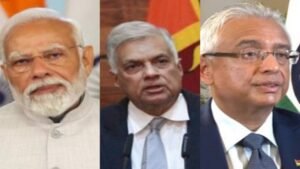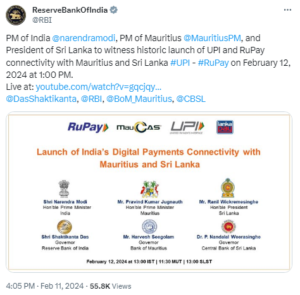India’s Unified Payments Interface (UPI) is scheduled to be launched in Sri Lanka and Mauritius on February 12, marking another milestone in its global expansion. The event will witness the participation of Prime Minister Narendra Modi, Sri Lanka’s President Ranil Wickremesinghe, and Mauritius’ Prime Minister Pravind Jugnauth.
The launch ceremony will be conducted through video conferencing at 1 PM on February 12, with the presence of respective central bank governors.
Benefits and Objectives
 The Indian government, in a statement released on February 11, outlined the significance of the launch in strengthening the digital connectivity between India, Sri Lanka, and Mauritius.
The Indian government, in a statement released on February 11, outlined the significance of the launch in strengthening the digital connectivity between India, Sri Lanka, and Mauritius.
Emphasizing the deep cultural and people-to-people linkages among these nations, the government highlighted the potential for a faster and seamless digital transaction experience.
The extension of UPI and RuPay card services aims to benefit a wide cross-section of people, facilitating convenient digital payments and enhancing economic ties.
Impact of UPI on Travel and Trade
The launch of UPI in Sri Lanka and Mauritius will be creating a significant impact on travel and trade between these nations and India. It will enable the availability of UPI settlement services for Indian citizens traveling to Sri Lanka and Mauritius, as well as for Mauritian citizens visiting India.
Furthermore, the commencement of RuPay card services in Mauritius will empower local banks to issue cards based on the RuPay mechanism, facilitating transactions both within Mauritius and with India.
Global Expansion Strategy
 The launch of UPI and RuPay card services in Sri Lanka and Mauritius is part of India’s broader strategy to promote the use of rupee and its payment systems on a global scale.
The launch of UPI and RuPay card services in Sri Lanka and Mauritius is part of India’s broader strategy to promote the use of rupee and its payment systems on a global scale.
Over the past few years, Indian authorities have been actively pursuing partnerships and agreements to integrate UPI with fast payment platforms in various countries.
Initiatives such as the establishment of a mechanism to settle global trade in rupees and collaborations with countries like the UAE, France, and Singapore showcase India’s commitment to expand its digital payment ecosystem worldwide.
Future Prospects
India’s efforts to globalize its payment systems are not limited to Sri Lanka and Mauritius. Discussions are ongoing with other countries, including Indonesia, as well as nations in Latin America and Africa, to further extend the reach of UPI and RuPay.
These initiatives hold the promise of promoting greater financial inclusion, along with cross-border trade and tourism, and strengthening India’s position as a leader in digital innovation on the global stage.
The launch of India’s Unified Payments Interface (UPI) and RuPay card services in Sri Lanka and Mauritius proves to be a significant step towards encouraging global, digital and financial inclusion. By making use of the relations between India and these nations, the initiative aims to create a seamless and efficient digital payment ecosystem that benefits individuals, businesses, and economies alike.
 As India expands its digital payment infrastructure beyond its borders, it is not only facilitating easier and faster transactions but also promoting greater financial access and empowerment.
As India expands its digital payment infrastructure beyond its borders, it is not only facilitating easier and faster transactions but also promoting greater financial access and empowerment.
The extension of UPI and RuPay card services opens up new avenues for cross-border trade, tourism, and investment, driving economic growth and prosperity in the region.
Looking ahead, India’s efforts to integrate its payment systems with those of other countries demonstrate a commitment to build a more interconnected and resilient global financial network.
Recently, the RuPay card was in news when Bank of Baroda (BoB) started offering zero balance savings account. By setting up partnerships and collaborations across continents, India is laying the groundwork for a future where digital payments are widespread, inclusive, and secure.
The potential for UPI and RuPay to become global standards in digital finance becomes increasingly apparent. Through innovation, collaboration, and a shared vision of financial inclusion, India is leading the way towards a more inclusive and interconnected digital economy, where borders are no longer barriers to financial access and opportunity.











Comments 1